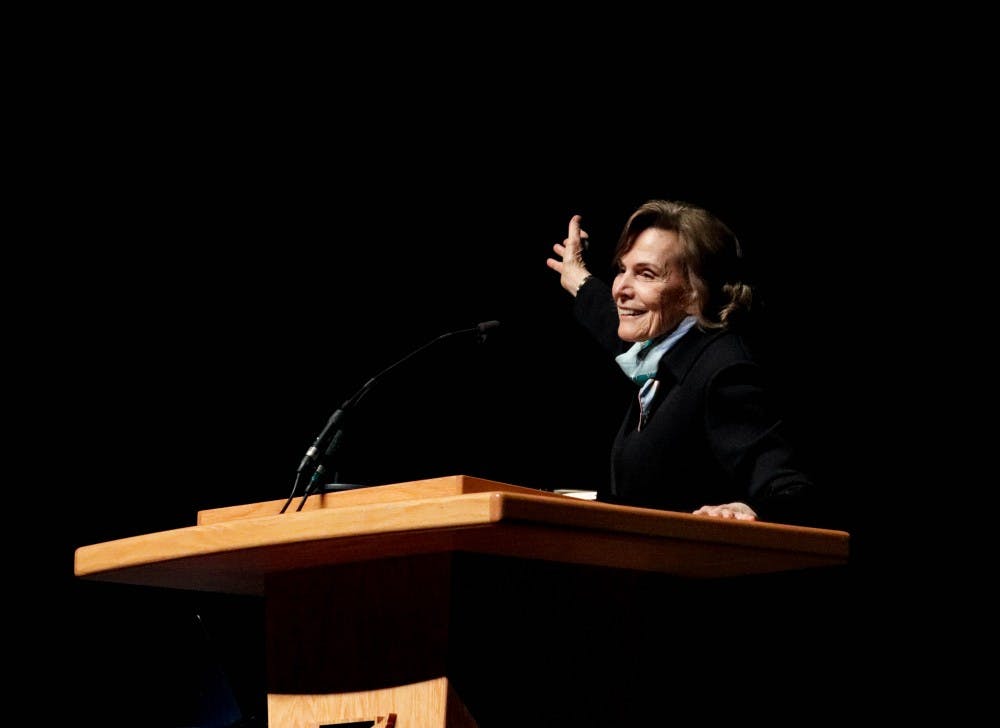An author of more than 200 publications and leader of more than 100 expeditions with over 7,000 hours underwater, Earle is a graduate of Florida State University with M.A. and Ph.D. degrees from Duke University and 27 honorary doctorates, including an honorary degree from Ball State in 1991.
From walking on the ocean floor more than a quarter mile under the surface, to living underwater for two weeks, Sylvia Earle knows more than a thing or two about marine science.
With thousands of hours logged in — and under — the water, and given her more than five decades spent studying algae, fish and other facets of aquatic life, Earle has gained more firsthand knowledge of the world within the deep blue than most other scientists in the field.
The esteemed oceanographer — whose credentials have earned her recognition as a TED Prize Winner, an Explorer in Residence at the National Geographic Society and a 2018 finalist for the prestigious Indianapolis Prize — shared her love for and vast knowledge of marine conservation during a speaking engagement Tuesday at John R. Emens Auditorium.
During Earle’s hour-long presentation, awareness of human impact on oceans and the environment and finding ways to reverse and improve changes to our planet were reverberating themes.
“What is the future we want?” Earle said. “It's a good question, because for the first time, we have the capacity not only to imagine what the future could be — not just accept whatever comes our way, not just react to the natural world and the actions of our fellow humans. We have the power, armed with knowledge, to make choices that will take us to a better place than we now have.”
Extreme weather events and pollution levels have soared in recent decades, Earle said, and in the last 30 years, habitat loss for fish has dwindled, and nearly half of the world’s coral reefs have died. “Owed to what?” Earle asked. “Our actions.”
And while burning fossil fuels and using oil have helped us advance, Earle said, humans are now able to see the problems these actions have caused.
“Before, we weren't thinking of the costs where we were looking at the benefits,” she said. “Now we can see it. We can be active in terms of what we do about it.
“Now that we've got this problem, what is the world we want? Do we want a world where plastics and other things are clogging the ocean? Or do we want a world where we make better choices, think of better solutions about the way we live our lives?”
Additionally, “a growing appetite for ocean life” is causing drops in the global population of tuna, swordfish, sharks and other aquatic life, Earle said. If human fishing activities continue, the “rate of accelerating loss” of these animals could lead to a detrimental shift in the food chain.
“This is cause for attention. If we keep doing what we’re doing to sharks and other fish, they’ll be gone by the end of the century,” Earle said. “We have so much to lose.”
While steps in the right direction are slowly being taken in different places across the world, Earle called on those in the audience — and humans everywhere — to “do something, because the time is now.”
“We have time, but not a lot,” Earle said. “Right now, mostly in the next 10 years, will shape the next 10,000 years. We need to protect nature as if our lives depend on it, because they do.”
To start? Earle suggests getting immersed in the natural world and “getting to know the creatures of the sea.”
By doing so, Earle said the Earth will be home to more conservation ambassadors who want to “protect and respect nature and its inhabitants.”
“Here we are knowing that we’re not in such a good place,” Earle said. “Through the choices we make about what to eat, what to wear, who to vote for, and whether you choose to do something in your community that will leave the place a better place … Just do it, do something, and watch what happens.”
Contact Casey Smith with comments at casmith11@bsu.edu or on Twitter @SmithCaseyA.





